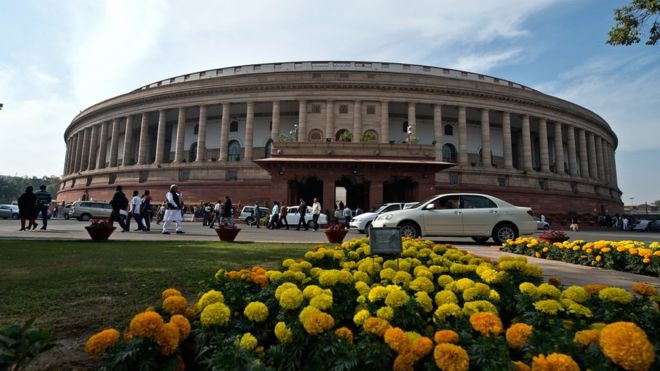The new Parliament starts its session Monday even as the Opposition has yet to reconcile to the unexpected sweep of the BJP in the Lok Sabha polls. The despondence is most evident in the Congress party where nothing seems to move, faced as it is in one of the worst crises caused by party chief Rahul Gandhi’s refusal to continue leading the party. Last heard is that the party chief was away vacationing abroad after the gruelling campaign schedules. This, while pressing matters are waiting for his attention back home. The party has not been able to decide even on who will lead it in the Lok Sabha. Notably, though, Rahul Gandhi had stated a while ago that despite the small strength of the Opposition, the Congress would put up an effective performance from the Opposition benches.
All eyes during this session would be on the Union Budget that will be introduced after presentation of the Economic Survey report. The previous Modi government had presented a budget which, among other things, offered pensions to farmers and the unorganised labour. That budget would undergo changes as a new-old government is in place to take matters forward for the next eight months of this fiscal. In new decisions, shopkeepers, too, have been brought in to the pension scheme. All these would entail huge expenses and it needs to be explained how the government would line up resources for such massive doles. It seems like all political parties in India, once they come to power, immediately start preparations for the next election.
Also, Prime Minister Narendra Modi has given some hints about his way forward, as he addressed the Niti Aayog meet Saturday. He aimed to turn India into a $5 trillion economy by the end of his present term in 2024 from the present $2.5 trillion figure. Achieving this might be a task in itself. China already boasts of a $10 trillion economy; India has a very long way to go. The US, by the way, has a $20 trillion economy. The Indian PM has also stressed his plan to carry all sections of the population together on the path to progress – ‘Sabka Saath, Sabka Vikas’. In reality, however, we can at best watch how things would pan out. This session of the current 17th Lok Sabha would show how the first few steps are going to be taken by this government.
Three major items of consideration could be the amendments to the Aadhaar bill, the Citizenship Registry bill and the Triple Talaq bill. The cabinet has given its approval to the bill on Aadhaar as also the one on Triple Talaq. The Citizenship Registry bill, like the other two, faced odds in the previous Parliament and could not move forward. Ordinances have already been promulgated on these legislations, giving them a new life but subject to parliamentary approvals. Contentious issues are involved in all these and different sides require a fair hearing. It is difficult to predict how humanitarian this setup would be.
Notably, the new Parliament would be missing several veterans. Former prime ministers Dr Manmohan Singh and HD Deve Gowda for instance. Singh used to play an appreciable role by participating in discussions on important matters in the Rajya Sabha. The House will, for now at least, miss his valuable experience in state-craft. His RS term ended Friday and an immediate return to the house is unlikely in view of the lack of strength for the Congress in state assemblies where elections will now be due. Deve Gowda, as also Congress floor leader in the Lok Sabha Mallikarjun Kharge, had been defeated in the LS polls in Karnataka this time. So was senior Congress hand Jyotiraditya Scindia from Madhya Pradesh. With the Congress having faced a washout in the Hindi belt, its adverse impact will be felt in the Lok Sabha also in terms of lack of experienced leaders on the Opposition benches. On the BJP side too, the absence of LK Advani, Dr MM Joshi, Sushma Swaraj and former Speaker Sumitra Mahajan will be felt. Some veterans from the Opposition side have excused themselves out of the contest this time for personal or other reasons. The lower House will, hopefully, demonstrate new energy and power by the new set of MPs, nearly 80 of them being women.
What was feared before the polls was a hung parliament and resultant problems like horse-trading. The wisdom of the electorate ensured that the institution of democracy would continue to hold its head high in India through the instrument of Parliament. How this massive one-party victory will be used for the future of this nation is to be observed.







































